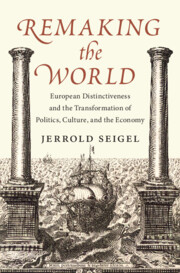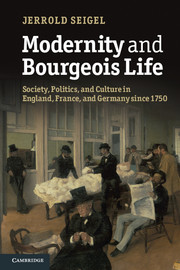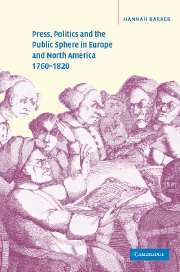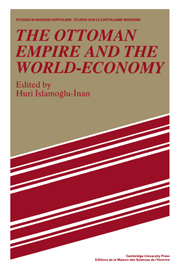Remaking the World
How should we understand Europe's special role in world history, and the enduring impact it made on the rest of the globe? Jerrold Seigel traces both the positive and negative sides of the continent's special role to its absence of effective central authority, the division and competition between its states and peoples, and its propensity for developing autonomous spheres of activity. Remaking the World analyzes how these features fostered Europe's characteristic preoccupation with a politics of liberty, its evolution of an aesthetic sphere animated by values specific to itself, its singular capacity to revolutionize scientific understanding, and its ability to prepare and carry out the first transition to a modern industrial economy. Extended and substantive comparisons with Africa, India, China, and the lands that came under the rule of the Ottomans demonstrate the absence of similar phenomena elsewhere, whereas in Europe they also helped generate the malign force of imperial expansion.
- Provides a new understanding of Europe's ability to be the first site where humanity revealed its capacity to remake its world, both in productive and destructive ways
- Traces Europe's distinctiveness to enduring structural features of its social and political organization, and its evolution of autonomous spheres of activity
- Provides extended and substantive comparisons with corresponding features of other countries and regions, especially China, India, and the lands that came under the dominion of the Ottomans
Reviews & endorsements
‘A work of breathtaking scope and erudition, this is macrohistory at its best, an original answer to the classic question of why Europe came to dominate the world. Europe’s advantages, Seigel convincingly shows, emerged from no inherent superiority but from the autonomous spaces for innovation that the continent’s political and religious disunity opened up.’ Edward Berenson, New York University
‘Jerrold Seigel’s new book is an intriguing intervention in the long-running and often heated debate about the place of Europe in the history of the world.’ Jonathan Sperber, University of Missouri
‘Seminal, groundbreaking, exceptionally informative, impressively organized and presented history.’ James A. Cox, Midwest Book Review
‘Recommended.’ J. Wigelsworth, CHOICE
Product details
February 2025Hardback
9781009541664
378 pages
235 × 161 × 34 mm
0.69kg
Available
Table of Contents
- 1. Introduction
- Part I. Liberty and Liberties:
- 2. A preoccupation with liberty
- 3. From liberties to liberty
- 4. Liberties elsewhere
- Part II. Autonomy and Teleocracy:
- 5. Spheres of autonomy: the church, universities, and the bounds of reason
- 6. Classical humanism and aesthetics
- 7. Science as a sphere of autonomy
- 8. Teleocratic sciences
- Part III. Openness and Domination:
- 9. Other peoples, other places
- 10. Empire: material expansion, moral contraction, and internal criticism
- 11. Courage and weakness: anti-imperialism and its limits in the nineteenth century
- Part IV. Transformations:
- 12. Autonomy and transformation: Britain
- 13. Transformation and autonomy: France and Germany
- 14. Ready or not? China and India
- 15. Conclusion.









.jpg)
.jpg)